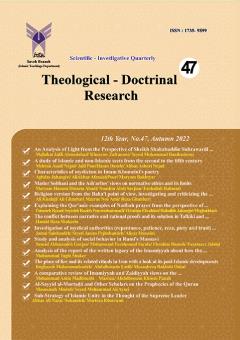Master Sobhani and the Ash'arites' views on normative ethics and its limits
Subject Areas : Islamic theologyMaryam Hatami Hossein Abadi 1 , noushin abdi savojiyan 2 , Enshaallah Rahmati 3
1 - PhD Student, Department of Islamic Philosophy and Theology, Central Tehran Branch, Islamic Azad University, Tehran, Iran
2 - Faculty of Central Tehran Azad University
3 -
Keywords:
Abstract :
Ethics discusses the great importance of man and proving the continuity of its principles is one of the branches of the issue of admiration and denunciation. The totality and continuity of the principles of ethics does not change with the change of requirements, habits, imitation. The issues of admiration and denunciation are also practical and fundamental issues of ethics, and the differences between the readings and perceptions of good and evil in ethics have created conflicting views. This article uses descriptive-analytical method and using library sources while considering the theoretical foundations of Ash'arites and Master Sobhani about good and bad and its effectiveness to the schools of normative ethics. Ash'arite epistemology regarding the goodness and ugliness of the Shari'a has had several consequences, such as belief in acquisition and obedience instead of creation and production, Ilam, permission to change and not to do it, permission to do so and not to do it, discrimination between human beings in this world and the hereafter, prophecy And infallibility, sending the messenger and its absence, conquest, divine favor to all or some of the servants, even immorality and infidels.On the other hand, Master Sobhani, by pursuing the theory of moral nature and relying on its inherent goodness and ugliness, begins his moral theory with a discussion of normative ethics and generally seeks a military explanation of the rules and principles governing moral actions.
قرآن کریم
اشعری، ابو الحسن، ۱۴۰۸، اللمع في الرد على اهل الزيغ و البدع، لبنان، دار لبنان للطباعة و النشر.
اشعري، ابوالحسن، 1430، الابانه، قاهره-مصر، مکتبه الثقافه الدینیه
امید، مسعود، ۱۳۸۸، فلسفه اخلاق در ایران معاصر، تهران، نشر علم.
باقلانی بصری، ابو بکر بن مھیب، ۱۴۰۷، الانصاف في ما يجب اعتقاده و لايجوز الجهل به، بيروت، عالم الكتب.
بغدادی، عبد القاهر، ۱۴۰۱، اصول الدين، بیروت، دارالکتب العلمية.
تفتارائی، سعد الدین مسعود بن عمر، ۱۴۰۹، شرح المقاصد، تحقیق و تعليق عبدالرحمان عيره، قم، منشورات الشريف الرضی.
جرجانی، میر محمد شریف، ۱۳۷۰، شرح المواقف، قم، منشورات الشريف الرضی.
جوادی، محسن، وحسين اترك، 1386، نظریه اخلاقی قاضی عبدالجبار معتزلی، فصلنامه علمی- پژوهشی پژوهشهای فلسفی- کلامی، شماره1، شماره پیاپی 33، پاییز 1386.
جوادی، محسن؛ و قباء محمد شیخ، ۱۳۸۷، معناشناسی حسن و قبح از دیدگاه عالمان مسلمان، فصلنامه علمی پژوهشی آینه معرفت، ش۱۶، تهران.
جوینی، امام الحرمین عبدالملک، ۱۴۱۶، الارشاد الى قواطع الادلة فی اصول الاعتقاد، تحقيق اسعد تمیم، بیروت، عوةالكتب الثقافية.
حلی، حسن بن یوسف، ۱۴۱۳، کشف المراد فی شرح تجرید الاعتقاد، حواشی و تحقیق سید ابراهیم موسوی زنجانی، قم، منشورات نكوري.
دايرة المعارف بزرگ اسلامي، ج هشتم، چ اول، تهران 1377
رازی، فخر الدین محمد بن عمر، ۱۴۰۵، تفسير الفخر الرازي المشتهر بالتفسير الكبير و مفاتیح الغیب،بیروت- لبنان، دار احیاء التراث العربی.
رباني گلپايگاني، علي، 1385، فرق و مذاهب كلامي، قم، مرکز جهانی علوم اسلامی.
سبحانی، جعفر، 1377، حسن و قبح عقلی یا پایه های اخلاق جاویدان، به کوشش علی ربانی گلپایگانی، تهران، پژوهشگاه علوم انسانی و مطالعات فرهنگی.
سبحاني، جعفر، 1378، فرهنگ عقايد و مذاهب اسلامي، قم، انتشارات توحيد.
سعیدی مهر، محمد، 1377، آموزش کلام اسلامی، قم، موسسه فرهنگی طه.
شهرستانی، ابي الفتح محمد بن عبد الكريم، ۱۴۰۲، الملل و النحل، تحقق محمد سید گیلانی، بیروت، دار المعرفة.
شهرستاني، محمد بن عبدالكريم، 1391، نهايةالاقدام، تهران، کتابخانه، موزه و مرکز اسناد مجلس شورای اسلامی.
طوسی، خواجه نصیر الدین، 1405، تلخيص المحصل (معروف بنقد المحصل)، بیروت- لبنان، دارالأضواء.
گنسلر، هری، 1387، درآمدی جدید به فلسفه اخلاق، مترجم حمیده بحرینی، تهران، آسمان خیال: نقد قلم.
لاریجانی، صادق: مجله تخصصی کلام اسلامی، مقاله فلسفه اخلاق .
مصباح یزدی، محمدتقی، 1377، خودشناسی برای خودسازی، قم، موسسه آموزشی و پژوهشی امام خمینی (ره).
مصباح، محمدتقی، 1384، نقد و بررسی مکاتب اخلاقی، تحقیق و نگارش احمد حسین شریفی، قم، موسسه آموزشی و پژوهشی امام خمینی (ره).
مظفر، محمد حسن، ۱۳۷۴، دلائل الصدق، ترجمه محمد سپهری، تهران، مؤسسه انتشارات امیر کبیر.
وارنوک، مری، 1380، فلسفه اخلاق در قرن 20 ،ترجمه ابوالقاسم فنایی، قم، بوستان کتاب قم.
هلومز، رابرت ال، 1389، مبانی فلسفه اخلاق، ترجمه مسعود علیا، تهران، ققنوس.


